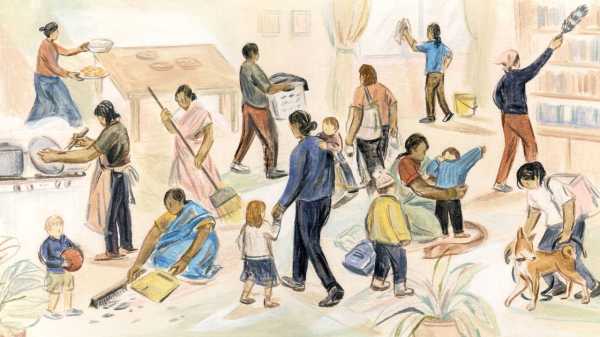
I gave birth to my children in China and India. My husband and I were foreign correspondents, and so our sons were born into expatriation—Americans growing up in Asian megacities on the cusp of the Asian century. It wasn’t my goal to have children overseas; it just happened that way. I got pregnant when I could and gave birth in the countries where I found myself at the time. I wanted to keep working, and I wanted to have my children. It seemed simple before it began.
But then the babies were born. My husband came and went for work, travelling in the way that I had once travelled, the way that we had once travelled together—across the country, around the world, bringing back pages of scribbled notes and clothes soiled with the dust of roads I’d never walked. I stayed home with my children and my writing and the women who watched our children and cleaned our house so that I could keep writing. At first, I pushed these women to the edge of my thoughts. They were important to me, primarily, because they made me free. I wanted them to be happy. I didn’t want to know the details. But that didn’t work for long. The women were there. The women were here. We are here, together. I understood all too well the functional purpose of our arrangement, but I wasn’t sure that it made any sense. I was renting women away from their own children so that they could help care for my children so that I, in turn, could use my hands and brain for different work. We were all snared together, trying to use one another to fulfill our various needs. Did it work?
Mary came to us from a throwaway line on a listserv: “She is a wonderful lady, handles kids and babies extremely well.”
I knew that the brevity of this ad was probably a bad sign. Most outgoing employers expiate their guilt with reference letters so lavish that they qualify as fiction. The women are “amazing,” “fabulous,” “indispensable”; they are a melding of Mary Poppins and Florence Nightingale, so DON’T MISS YOUR CHANCE to hire them! The absence of superlatives was a red flag.
But I was heavily pregnant, exhausted, and desperate for childcare. We’d just moved to New Delhi, where my husband hustled off each morning to his new job, leaving me to find an apartment and care for our two-year-old and pretend that I was going to finish a book manuscript before giving birth. I called and Mary came.
Other candidates had sniffed and twitched, peering anxiously around the hotel suite as if our temporary home was a harbinger of familial instability. Not Mary. She sat with her feet firmly planted, rested her hands on generous thighs, and regarded me thoughtfully from a broad, calm face. Her family roots lay in the borderlands between Bhutan and India. She had studied with the nuns in Darjeeling. She was a widow whose two teen-age children had been raised, in Assam, by her mother-in-law.
I waited for the catch, but it didn’t come. Mary had worked for years in the home of the U.S. consul general. She’d taken courses in first aid and child development. She was fluent in multiple languages. Her police verification had been done, and she’d undergone a background check in order to work on the grounds of the American embassy.
I told her that I wasn’t sure where we’d be living but named some of the neighborhoods under consideration.
“No problem, Madame.”
I explained that she’d have to start working for us in the hotel suite, which I understood was unorthodox and awkward.
“No problem, Madame.”
“You don’t have to call me Madame.”
“Okay, Madame.”
“No, I mean really—”
“All right, Madame.”
“Oh . . .” I was too embarrassed to continue.
For five and a half days a week, she’d get a starting salary of fifteen thousand rupees a month, or about two hundred and thirty-five dollars. To her monthly pay, we’d add five hundred rupees for her phone usage, plus another two thousand for bus money and lunch—a total of about forty dollars. We’d pay her medical costs, and, twice a year, we’d give her fifty dollars to buy clothes. For overtime, which she was free to take or leave, she’d earn a dollar and fifty cents an hour. She’d get a pay raise after six months and every year thereafter.
Mary didn’t quibble, and I wasn’t surprised. At that time, I hadn’t come across anybody who paid more. In this sprawling city, where maids are common in middle-class homes, where wealthy and impoverished inhabitants live suspended in intermeshed codependence, I’d heard of domestic workers who earned as little as a hundred dollars a month.
Mary, in turn, explained her only condition: she didn’t want to live in the servants’ quarters that come attached to many Delhi apartments. Her boyfriend was a Nigerian man whom she’d met through church, and it would be uncomfortable—really, it would be impossible—for him to live among the domestic workers of India.
“People are a little bit racist,” she explained gently. I assured her that we didn’t care where she lived.
Months passed, and our family adapted to a new incarnation. We brought our newborn, Patrick, home to the second floor of a stately post-partition house in Sunder Nagar, a lush neighborhood by the zoo. As soon as we moved in, I hired a housekeeper to cook and clean. I’d made the strategic decision to hire domestic help lavishly and guiltlessly. I planned to detach my brain from everything but childcare and writing. With a housekeeper in place, Mary could concentrate on babysitting. That ought to be enough, I decided. I mean, you didn’t want a crowd in the house, right?
Sadly, the first housekeeper was a disaster. There is no space to dwell on the depressing particulars here. He was a man, too, and I hate to introduce a narrative thread that would undercut my thesis that men ought to perform more housework. I’ll simply say that, under his stewardship, our house slowly descended into filth, nobody liked his cooking, and, when we finally fired him, a chunk of cash disappeared from what we’d thought was an undiscovered hiding spot.
That was a false start, but I wasn’t deterred. I called some more candidates.
One of them was Pooja.
In a show of eagerness, Pooja showed up an hour early and ground her thumb into the doorbell. The napping baby awoke and screamed. I yanked open the door and glowered. Pooja stared back, listless and aloof, in a baggy sweater, loose trousers, and thick eyeglasses that kept slipping down her nose.
“Yes?” I said to a short, nervous-looking person who trailed Pooja inside.
“My husband, ma’am,” Pooja said flatly. “Varun.” He grinned with sharp teeth.
“O.K.” I lingered on each syllable so they’d know that I didn’t welcome this interloper.
“You’re early.” I turned to Pooja. “I wasn’t expecting you yet.” “Sorry,” she said. None of the flutter of the other candidates. Not: Sorry, Madame. Not: Oh, so sorry. She shifted her weight and waited, unapologetic and a little bored, for me to say something.
“Have a seat.” I tried to warm my tone from mean to brisk.
Pooja glanced at the upholstery as if appraising the difficulty of cleaning the stain of herself from the fabric. Her husband, ignored and unsure, retreated to a sofa against the far wall.
I asked Pooja perfunctory questions and scrawled her answers into a notebook. She’d worked as a nanny and cook. Her first husband had died when Pooja was still pregnant with their son. She’d left the child in her father’s care and come to Delhi to work. My questions were few; the interview was just for show. I’d already decided against Pooja.
She handed me her reference letters. I ran an eye over the top sheet and started. I knew the name. “Your old boss was my neighbor in Beijing.”
“I worked for her until she moved to China.”
“I knew then,” she’d tell me later. “I knew I would work for you.”
I did not share this belief. The coincidence wasn’t enough to erase my distaste. “We’ll be in touch,” I said. You’re not for us, I thought.
“Her references are great,” Tom said that night. “You should e-mail your friend.”
“Think so?”
“Small world,” began my e-mail to Beijing. The reply was immediate. “She’s a gem . . . You would be lucky to have her . . . I have missed her every day.”
This didn’t sound anything like the woman who’d visited our home. Doubtfully, I offered Pooja a week-long trial. Just until we found somebody suitable, I told myself.
“Once I get a tryout,” Pooja told me later, “I always get an offer.”
No wonder: suddenly we were eating creamy potato gratin and hearty butter chicken and melt-in-your-mouth spinach quiche. Pooja scrubbed every room to a shine and amused Max by drawing elaborate elephants and recounting Hindu myths. By the end of the week, our house hummed along as never before—a neat, orderly place, rich with the smells of cooking.
The coincidences continued. When Mary and Pooja set eyes on each other, they shouted and embraced. They had gone to high school together, it turned out, in a convent school in Darjeeling.
“Maybe the universe is trying to tell us something,” I said to Tom.
I offered Pooja the job. She’d earn the same salary as Mary, minus the bus money. She moved into the servants’ quarter in our back yard, and everything became easy. She came early in the morning, took a long midday lunch break, and stayed through Max’s bedtime—keeping Patrick company in the living room while I lavished stories and good-night cuddles on Max before turning to the baby’s last feeding.
Once Pooja took over the cooking, I regressed to adolescent disinterest. I’d shamble into the kitchen and carelessly ask, “What’s for dinner?” It was a question that never got old. Pooja gloried in the responsibility—she took careful note of our tastes, surprised us with new dishes, pored over cookbooks.
When she held Patrick in her arms, he lay rapt, eyes drinking in her smooth cheeks and awkward eyeglasses. She whispered to him in Nepali. She sang to him in Hindi. She turned on the kitchen radio and shimmied to Yo Yo Honey Singh, and Patrick laughed hysterically.
“Babies always love me,” she said and shrugged.
As for Patrick, he was so easygoing that I found it disconcerting. His day was a shifting round of caretakers, sights, and sensations: oil massages with Mary, feedings with me, and babbling to Pooja from his bouncy chair while she cooked. On Christmas Eve, at just over two months old, he slept twelve hours in a row overnight. He did the same thing the next night and the night after that and every night to come. I could have wept with gratitude. In fact, I think I did.
There was a sense of plenty, of life’s messy eruption. The children thrived, everybody slept, and Tom and I both got our work done. We’d had another baby, but, thanks to the women whom we’d hired into the house, there was still enough time for everything. Mary took Max to the park and the zoo and escorted him to playdates. Patrick never tired of hanging around with Pooja.
“If you leave India, please give me warning,” Pooja said one day. “Otherwise it’s too hard. We get to love the kids, too. You know?”
She was not the first woman I’d hired to care for my children, but she was the first to confess to sentimental entanglement. She was the only one who’d ever talked to me with the linguistic fluency and emotional frankness that made her seem more like a friend than an employee.
It didn’t stay that simple. Time brought us drinking and violence, indignities and unhappy endings. The small triumphs and enormous miseries of poor life in a ruthless city. We were women who came together to perform strict roles, but the contradictions of our full selves could not always be suppressed.
In the beginning, though, it seemed perfect.
We were all working mothers. That was the basic thing. The women who shifted my thinking and cleared the way for my work and cared most lovingly for my children were migrants who’d left their own children behind to work in the city and ended up in my house. We spun webs of compromise and sacrifice and cash, and it all revolved around me—my work, my money, my imagined utopias of one-on-one fair trade that were never quite achieved.
When I was a reporter, there existed this cliché about women who covered wars and other humanitarian disasters overseas. They used to say—and we used to say sometimes, too—that we were a sort of “third gender.” We couldn’t dream of being men, of course, but we were also exempt from some of the constraints that bound the women we wrote about. We could bare our faces in the street or sit with the men at a segregated dinner. Maybe a commander who would never talk to a woman from his own country would grant us an interview. We were bridges between the tacit maleness of the news organizations that had sent us and the women who were affected by the news, the grieving mothers and worrying wives. We were neither here nor there.
No matter how much time I spent with a subject, no matter how intimate the interviews became, a yawning space separated me from the people I wrote about. They had one kind of life, and I had another. The particular troubles faced by the women I interviewed did not affect me, nor did my own personal struggles have anything to do with them. I was just passing through. After having babies, after raising children in close quarters with women I hired to help, this necessary distance began to warp and melt. I couldn’t maintain the sense that I was going along and everything was just fine. It didn’t seem fine. Sometimes it seemed crazy.
We stumbled confusedly through a house that was also a job site, grappling with the intimacy of underwear, bathrooms, feeding children, and cuddling them to sleep. Our routines were disrupted by pregnancy, abortion, miscarriage, weddings, funerals, sick children, and school fees. Mine, theirs. The stuff of women the world over. We lived together in the space left by men who were temporarily elsewhere. Men who hurt or loved, disappointed or disappeared. The promise of men, the threat of men, the uncertainty of men’s actions.
We were not unique. Our private problems are no doubt duplicated in households all over the planet. And yet, housework is seldom considered as a serious subject for study or even discussion.
This is an injustice on a grand scale, for housework is everything. It’s a ubiquitous physical demand that has hamstrung and silenced women for most of human history. I’d love to believe that the struggle for women’s equality is concentrated in offices and manufacturing plants, but I’ve become convinced that this battle takes place, first and most crushingly, at home.
When we are saddled with disproportionate work at home—and studies show that virtually all women are, particularly during child-rearing years—we are too embarrassed to say so out loud. We don’t want to complain. We don’t want to tax our romantic partnerships. And, in the end, we stand to be blamed. The fact of this disproportionate labor is further evidence of our incompetence. We didn’t choose the right partner (we are foolish); we didn’t stand up for ourselves (we are weak); we were outmaneuvered in our own homes (we lack tactical skills). It is proof that we are not sufficiently devoted to our children or to our careers, depending upon who’s doing the judging. It is proof—and there is ever more proof—that we ourselves are not sufficient.
Paid domestic workers—in developing economies and, increasingly, industrialized countries—are often promoted as a sensible solution for the problem of women and work. But this is a stopgap and an evasion. The commodification of housework underscores and exacerbates the shrinking of the middle class, because only women wealthy enough to pay for domestic help, or women poor enough to regard these jobs in terms of social mobility or survival, are affected. Domestic labor tends to be poorly regulated, rife with exploitation, and thorned with uneasy ethical entanglements. And yet, the lure is strong: for those who can afford it, domestic workers take the pressure off of parents and marriage, off of employers and society at large. I have seen online articles prescribing hired household help as a foolproof tonic for marital difficulties and even as the secret to life’s happiness. Whether these arrangements provide personal fulfillment and marital bliss to the domestic employees themselves—this detail is never mentioned.
One afternoon, two-year-old Max walked right up to the baby, who was burbling on a sofa, and slapped him across the face. It was a deliberate and righteous smack, and it rang through the rooms. Patrick erupted in howls. I dropped a spoon with a clatter and came running from the kitchen. Max skittered into hiding. Mary scooped Patrick up and buried his face in her neck.
She chuckled and rubbed his shoulder blades. “You came for this,” she said. “Life is this, only, babu. You came for this.”
I rocked to a stop, confused. I wanted to scold Max and then, with great fuss and indignant pomp, gather the victim into my arms—to assure the baby that the assault was unfair and unacceptable, an aberration that would not stand.
Mary’s instincts were exactly the opposite. She was telling the baby that he should expect unprovoked bursts of pain from a cruel and capricious planet. There was no order, no reason, no protection. She was comforting him, but there was laughter on the edge of her voice.
This is parenting without privilege, I thought. This is how you prepare your children when you don’t have the illusion that you can protect them.
I stepped back and looked at Mary. You came for this. What a thing to say. What a true thing to say. What a terrible and true thing to say to a child.
Mary caught sight of my frozen face and smiled. “It is not easy to become a mother,” she said.
This excerpt is drawn from “Women’s Work,” by Megan K. Stack, out this April from Doubleday.
Sourse: newyorker.com






